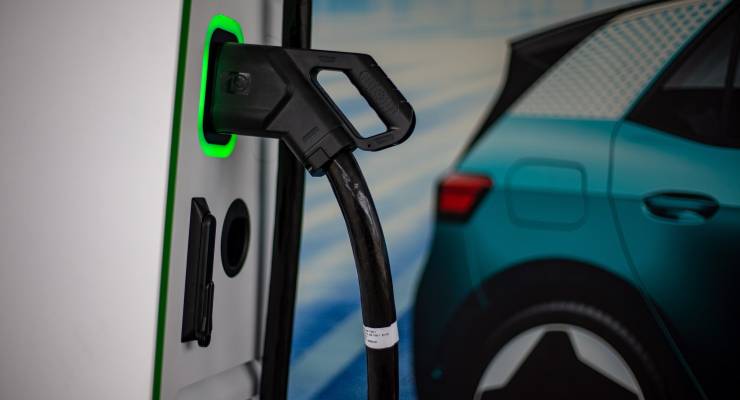
For anyone concerned with the need to decarbonise transport — or with sound economic policy — yesterday’s High Court ruling might seem like good news.
The court ruled Victoria’s tax on road use for zero- and low-emissions vehicles was unconstitutional, after two electric car drivers challenged the state’s ability to impose excise-type levies.
But given the High Court’s previous track record on constitutional interpretation, there’s a grave danger this decision will be extended to rule out any kind of road user charge. It threatens many other state levies too, from luxury cars to mining royalties.
Why was Victoria’s tax so bad?
EV drivers don’t buy petrol or diesel, which means they avoid the fuel excise that other drivers pay — and which pays for road maintenance. That’s why Victoria introduced its EV road user charge, which cost owners about 2 cents a kilometre driven.
Despite this plausible-sounding rationale, the road user charge was terrible policy, both environmentally and economically. A tax specific to electric vehicles could only slow their adoption, at a time when early adopters need to be encouraged.
And in economic terms, the policy rested on a misunderstanding of economics. The tax was supposed to address a “distortion” in the incentives generated when electric vehicle drivers paid less to use the roads than internal combustion engine vehicle drivers. But the government’s reasoning didn’t take into account a central principle of economic policy: the theory of the second-best.
Drivers who fill up with petrol, gas or diesel don’t bear the social and environmental costs of their choices in the form of carbon dioxide and other pollutants emitted, or the cost of the damage done to our lungs. So by taxing EVs, you make traditional car drivers better off — and that leads to worse social outcomes overall.
Three years ago, I finished a critique of the policy on a positive note, suggesting it opened the door to broader road user charges based on kilometres travelled. Sadly, it seems my assessment was premature.
In recent decades, the High Court has been taking ever more expansive interpretations of Section 90 of the constitution, which prevents state governments from “imposing duties of customs or of excise”.
In the first decades after Federation, “excise” was interpreted to refer to taxes levied on goods manufactured in Australia, just as customs duties are levied on imported goods. Over many years and many High Court decisions, the concept was broadened to include any tax or fee that increases the costs of goods for consumers.
The last remaining obstacle was the “Tobacco Tax” decision in 1974, which excluded consumption taxes from Section 90’s scope. But that, too, is now gone. Despite some scathing dissenting opinions, a 4-3 majority overturned the 1974 precedent and expanded the scope of Section 90 even further.
In doing so, it has created large headaches for state and territory leaders, who have propped up state finances with an assortment of taxes, excise schemes and other charges that could now be subject to legal challenge.
Did the High Court just kill road user charges entirely?
Victoria’s law was a bad one. But other road user charges can be very useful, as a way to discourage overuse of private vehicles, charge heavy drivers more, or speed up the shift to clean, quiet EVs.
The reasoning of the High Court majority — which held that the Victorian charge wasn’t related to the cost of providing roads — leaves some hope that a broader road user charge might pass muster.
But to the extent that different kinds of vehicles were charged differently, it seems entirely possible the court might rule that road user charges are an unconstitutional excise. And the recent tendency of the court has been to push logical consistency up to, and beyond, the limits of reason.
We saw this with the saga over Section 44. Early decisions ruled dual citizens were not eligible to stand for Parliament. Later, the court’s interpretation expanded to cover people who had lived their entire lives in Australia but who could theoretically be eligible for another citizenship. The end result was that as many as half of all Australians were ineligible to serve in Parliament.
We can hope the current decision will not be stretched in the same way. But nothing is guaranteed.
It may be that the only way to replace our current fuel taxes with road user charges will be through a uniform charge imposed by the Commonwealth.
There may be some creative alternatives. One way to resolve the problem might be to turn all roads into “virtual” toll roads, charging drivers based on use and converting state transport departments into government business enterprises.
For the moment, we can be grateful the Victorian government’s misguided and muddled tax policy has been scrapped — and a barrier to EV uptake is gone. But the High Court’s decision has flagged the need for urgent action at the national level to work out a consistent policy.
This is republished from The Conversation.








The Australian Electric Vehicle Association, a 50-year old organization dedicated to promoting electrification of transport, obviously welcomed the decision to strike down what was a fairly shambolic effort; the Victorian Ombudsman’s report makes this clear.
But we have also been advocating for a federally collected, universal, distance X mass road user charge since 2015. It has to be federally collected because the alternative was 8 different state or territory schemes and the muddle of paying to use roads in another state. But moreover, it would drive behavior change in the kinds of vehicles we buy and the patterns with which we use them.
In fact, the fuel excise should remain in place (albeit reduced) to continue as a disincentive to buy an internal combustion engine vehicle.
Apart from the can-o-worms that is broader federal-state financial relations, this ruling gives us a chance to finally get road costing right, and will also establish a good precedent for extending it to heavy vehicles – the reason our roads are as expensive as they are.
What “heavy vehicles” are relatively unique to Australia ? All I can think of are the massive road trains, and they’re not exactly something you see around town.
Australia has spend a collective $500 Billion on roads in the last 25 years; an astronomical sum. Much of it is through the creation of divided motorways and tunnels in cities. Part of the reason it’s so expensive is because we’re building roads capable of supporting fully laden B-doubles moving goods which could have been moved by rail had we not spent all that money on… motorways.
Light vehicle drivers have been subsidising the road-based heavy haulage of goods since forever, so some fiscal motivation to move goods by (electric) rail would be a great thing.
As for RUCs being regressive, it’s no more regressive than the current fuel excise which means those who drive more (and drive inefficient vehicles) pay more. But that’s why the mass multiplier is essential. If you must drive, and sadly in Oz, that’s a lot of us, you should be doing it in a smaller vehicle. If you choose to drive a Nissan Patrol 100 km a day from the boonies, rather than hatchback (electric or otherwise) you can expect to pay for the decision.
I suspect game of mates has more to do with sky-high infrastructure costs (and it’s not just roads) rather than them being particularly overengineered relative to other countries.
Great idea if you can afford two cars.
Dream on. We do things stupid and dirty around here, with the least deserving laughing all the way to the bank.
See what the damage, and the cost to regional 2nd, 3rd and 4th tier roads heavy transport does….. me thinks an increase in fuel excise etc. to speed up transition to EVs and train transport; versus fossil fuel, IC and road haulage lobbies…..
The Victorian treasurer, Tim Pallas, stated that the EV charge was about fairness in respect of paying for road maintenance, adding that EVs are heavier than ICE cars and thus cause more road damage.
Most ICE cars bring sold today are big SUVs and utes like the toyota hilux. Not a significant difference in weight as far as road damage goes.However he is correct in drawing attention to the nexus between vehicle weight and road damage. Heavy vehicles such as trucks, buses, semi-trailers, double B vehicles etc are responsible for most of the vehicle related damage to our roads.
The fuel excise which was purported by Pallas to be for road maintenance is therefore unfair in its application. Car owners who do the least damage to roads pay most of the cost of road maintenance, subsidising the damage done by heavy vehicles. Whatever road maintenance charge eventuates, it should, in all fairness, take into consideration vehicle weight and, for heavy vehicles only, distance travelled. Passenger vehicles should be exempted from the distance component given they cause little road damage and people living in outer suburbs and rural areas should not be unfairly disadvantaged. Of course the trucking industry lobbies are extremely powerful and if the industry had to pay for the actual repair and maintenance costs caused by their vehicles, supply chain costs would increase significantly. Perhaps it is time to consider investing in better rail freight infrastructure.
Given the referendum, no Australian government is going to be brave enough to impose road-user taxes at any time in the near future.
As petroleum use declines, expect to see some new energy taxes and higher car registration fees – but even that would require a fit of bravery by state governments, and would be bypassed by those with rooftop PV systems.
We bought an EV in March 2022. We’ve now been through two cycles if rego renewal but have not been asked to provide odometer readings. I think VicRoads lawyers knew what was coming.
I wouldn’t mind paying to use roads but we have zip alternative as there’s a pitiful public transport service where we live. And our biggest km usage is interstate.
You have been lucky! VicRoads made about three requests for odometer readings when my company vehicle’s registration was transferred from interstate.
The notion that the government has to “raise revenue” is sort of holding us back from the small matter of tackling climate change.
Sure State governments can’t print money but the federal government can and in fact does.
At a federal level taxes are used to destroy money and change behaviour. There’s two things we need to do to tackle climate change!
Destroy all the money the fossil fuel industry is making by taxing them out of existence!
But no instead we’re going to try and tax behaviour that we should be encouraging. Big slow hand clap.
How about treasurers actually go and learn about how their own budgets work?
It’s honestly like a bunch of priests not realising that their version of god probably wouldn’t condone what’s gone on with the various scandals…,,